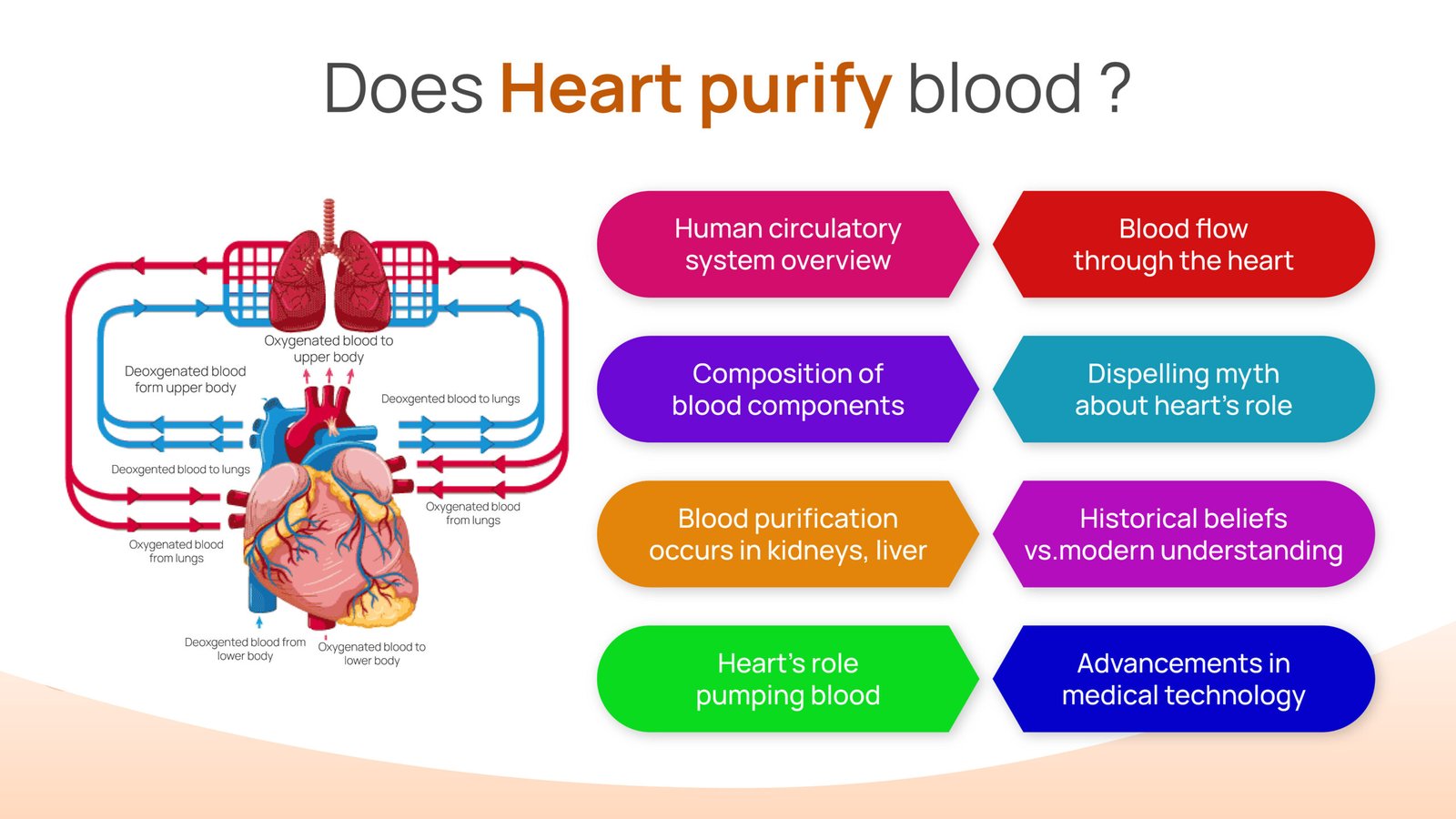
Author:- Mr. Ritesh Sharma
Does heart purify blood? Everyone has contemplated this question once in their lifetime. The human heart is a muscular organ that pumps blood to all the vital organs of the body, fulfilling their needs for oxygen and nutrients. However, it has also been romanticized as the organ controlling emotions and vitality. Furthermore, the organ is also associated with the purification of blood for the longest period of time. So, does heart purify blood? And if so, how and what is the complete procedure for it?
If you have also been ruminating about this question, worry not. This blog will clarify all your queries regarding the heart’s role in the purification of blood. Furthermore, we will also delve into the intricacies of the human circulatory system, making this discussion even more substantial and nuanced.
The Circulatory System
Before delving into the conundrum- does heart purify blood? Let’s try to understand the human circulatory system. The human circulatory system consists of three main components: heart, blood vessels, and blood. The primary function of the human circulatory system is to supply oxygen, nutrients, hormones, and waste products throughout the body. The medium of transportation for the human circulatory system is blood carrying out all the tasks efficiently.
Composition of Blood
The popular belief suggests that the blood is a stagnant fluid. However, the reality is stark. Blood is not a stagnant fluid but a dynamic tissue that consists of several components. The main components of blood are red blood cells, white blood cells, platelets, plasma, and dissolved substances like nutrients, hormones, and waste products. Each component of blood is given a specific role in orchestrating and maintaining the circulatory system.
Does Heart Purify Blood?
Now, comes the real fact. Contrary to popular belief, the purification of blood doesn’t even occur in the human heart. Instead, this process takes place in the kidneys and liver. Both kidneys pose as natural filters in the human body. They remove excess substances and waste products from the blood. These substances are thrown out of the body in the form of urine. On the other hand, the liver performs all metabolic functions in the body. Its basic role is to detoxify harmful substances and synthesize vital proteins. Hence, the human heart has no role in the purification of blood.
The Heart’s Function
The heart is undeniably an essential organ to the circulatory system, however, the answer to the question: does heart purify blood is simply no. The heart’s role in the circulatory system is to pump blood, not to purify it. It consists of four chambers: right atrium, right ventricle, left atrium, and left ventricle. These four chambers do rhythmic contractions which lets the heart pump oxygen-rich blood throughout the body. Furthermore, it also returns the oxygen-depleted blood back to the lungs for reoxygenation.
Blood Flow Through the Heart
The understanding of blood flow through the heart easily dispels the myth that it purifies the blood. Deoxygenated blood from the body enters the right atrium and is pumped into the right ventricle. From there, it is transported to the lungs via the pulmonary arteries, where it picks up oxygen and releases carbon dioxide. Oxygenated blood returns to the heart via the pulmonary veins, entering the left atrium and then the left ventricle. Finally, the heart pumps oxygenated blood to the rest of the body.
Busting the Myth
Now that we have understood the human circulatory system and the role of the heart in it, it has become evident that the heart only pumps blood to the vital organs of the body and it has no role in purifying the blood. Hence, the heart only ensures the circulation of blood throughout the body, but it doesn’t participate in its purification. The purification of the blood is done by the kidneys and liver instead of the human heart.
Misconceptions and Historical Beliefs
Since the wrong myth about the heart’s role in the purification of the blood has been debunked, let’s investigate from where the question- does heart purify blood stems from? Well, this myth stemmed from historical beliefs instead of scientific understanding. The ancient civilizations lacking the required resources to study the circulatory system used to believe that the human heart indeed purifies the blood. These beliefs often attributed mystical properties to the human heart. According to them, the human heart symbolizes love, courage, and vitality.
Modern Medical Understanding
In stark contrast to ancient beliefs, modern medical understanding gives correct insights into the heart’s physiological functions. The advancements in anatomy, physiology, and biochemistry provide a deeper understanding of the intricate workings of the circulatory system. Apart from this, medical imaging techniques like MRI and CT scans provide a comprehensive understanding of the function of the human heart and its complex structure. Hence, this leaves no room for any kind of baseless myths.
In conclusion, the question of does heart purify blood holds no merit at all. Ancient people used to believe that because they hadn’t learned about the circulatory system that well. However, with the advancements in technology, we have come to know that the heart plays no role in the purification of blood. It only pumps blood throughout the body ensuring the supply of oxygen and nutrients to vital organs of the body.
Blood purification is instead done by the kidneys and the liver which eliminates all the waste from the blood in the form of urine. By understanding the scientific principles governing the circulatory system, we can appreciate the heart’s true significance in maintaining human health and vitality and in addressing conditions like heart palpitations and cardiac arrhythmias



